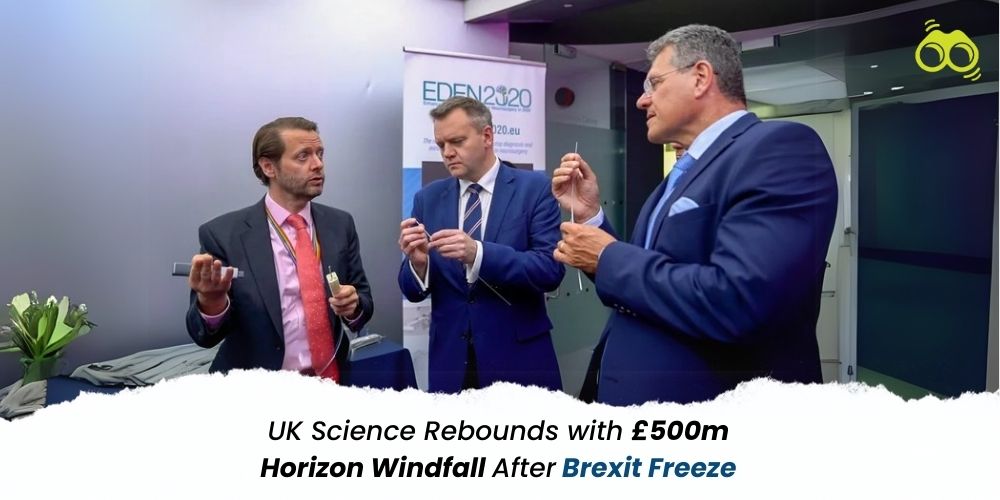EU Prepares Next Horizon Funding Cycle as UK Scientists Expand Their Impact
Renewed UK-EU Scientific Collaboration Sparks Innovation Across Key Fields
After years of post-Brexit uncertainty, the UK’s scientific community has made a remarkable return to the European research landscape. British researchers have rejoined the EU’s prestigious Horizon science programme, following a three-year hiatus caused by political tensions. This re-entry marks a crucial step in re-establishing the UK’s presence in European research. Since rejoining in 2024, UK scientists have secured nearly £500 million in funding through approximately 3,000 grants, positioning them at the forefront of non-EU participants and fostering a renewed spirit of international collaboration.
Meanwhile, EU officials are discreetly preparing the next seven-year Horizon funding cycle, set to launch in 2027. The UK’s strong performance in its first year back in the programme highlights its readiness to compete with major scientific players, including Germany and France, despite Brexit. British institutions have quickly re-engaged with high-impact research, with projects ranging from converting greenhouse gases into aviation fuel using yeast to groundbreaking biomedical innovations. A standout example is Professor Ferdinando Rodriguez y Baena’s 15-year research initiative at Imperial College London. Inspired by how wasps bore into tree bark, his team developed a microscopic cranial catheter to treat brain tumours.
Academic leaders have welcomed the UK’s return with optimism and relief. Professor Sir John Aston of the University of Cambridge emphasised Horizon’s competitiveness, noting that the UK's high success rate reflects its research strength. He further expressed hope that political conflicts would never again disrupt such vital international partnerships. Reinforcing this sentiment, Professor Rodriguez y Baena recently met with EU trade commissioner Maroš Šefčovič during a visit to Imperial College London, underscoring the renewed collaboration between British and European researchers. He also highlighted a growing European mindset among UK scientists, who are now actively seeking partnerships across the continent.
Professor Rodriguez y Baena’s Eden2020 project, which aims to develop a precision cranial catheter, received €8 million as part of an €11 million EU-funded initiative involving partners in Italy, Germany, and the Netherlands. Reflecting on the UK’s absence from Horizon, he described it as a “double whammy,” citing both financial losses and weakened European partnerships. Although informal exchanges continued, he stressed that joint funding remains essential for lasting collaboration. Similarly, Professor Carsten Welsch of the University of Liverpool noted the disruption caused by the UK’s exclusion, which cost him a leadership role in a Marie Curie network. A strong advocate for the UK’s reentry, Welch welcomed its return, stating that the country had shifted from merely maintaining a presence to actively leading innovation. His team now heads a €10 million project focused on plasma accelerator-based research infrastructure.
As the EU quietly prepares its next research framework, FP10, set to launch in 2027, Professor Welsch underscored the importance of the UK staying strategically involved, despite the secrecy surrounding the planning phase. In its first year back, the UK secured 2,911 grants worth €574.7 million, ranking first among the 19 non-EU associated countries in grant numbers and third in total funding. The University of Oxford led the UK institutions with €42 million, followed by Cambridge (€39.3 million), while UCL and Imperial each secured approximately €28 million. Warwick and Edinburgh received over €13 million each, with smaller awards going to the Royal Veterinary College (€275,000) and the Met Office (€1.22 million).
Looking ahead, new Horizon funding calls for space and industry will open at the end of May, with opportunities in virtual and augmented reality expected later this year—an area of keen interest for Professor Rodriguez y Baena. Meanwhile, Dr Rodrigo Ledesma-Amaro, a bioengineer at Imperial College London, warned of the harmful effects of the UK’s previous exclusion from Horizon. He noted that some British scientists were removed from international projects, which could have seriously impacted collaborations, postdoctoral training, and student exchange. Leading eight EU-funded projects focused on sustainable food innovation, Ledesma-Amaro has pioneered advancements such as the “solar spoon,” which converts solar energy into hydrogen, later transformed by bacteria into protein for food. His research also includes extending yeast lifespan for fermented food production and developing aviation fuel from yeast.
At the University of Cambridge, Professor Sir John Aston highlighted Professor Erwin Reisner’s work in converting solar energy, renewable electricity, and greenhouse gases into sustainable fuels and chemicals. Reisner recently met with UK EU relations minister Nick Thomas-Symonds to showcase Cambridge’s Horizon-funded research, which also includes projects on iridescent plant colours and AI information theory.
Aston emphasised that Horizon funding not only drives academic progress but also fuels real-world innovation. Although Cambridge possesses extensive expertise, he noted that collaboration with European universities and industry partners is essential, as no single institution can address all global challenges alone. The UK’s return to Horizon represents a critical milestone in strengthening international research partnerships, ensuring long-term scientific progress and innovation.
Editor's Note:
The UK’s return to the EU’s Horizon science programme after a three-year hiatus has been widely recognised as a pivotal moment for its research community. Experts have emphasised that this reintegration strengthens the country's global scientific standing and fosters renewed collaboration with European institutions. Researchers have swiftly re-engaged with high-impact projects, securing substantial funding and demonstrating their ability to compete on the international stage. Academic leaders have expressed optimism, noting that scientific progress should remain independent of political disruptions. The United Kingdom's re-entry into Horizon Europe has catalysed numerous innovative initiatives across diverse sectors, including biomedical research and sustainable energy development.
Skoobuzz has observed that the UK's substantial success in securing grants underscores its formidable research capabilities, solidifying its position as a leading non-EU participant.














0 Comments (Please Login To Continue)